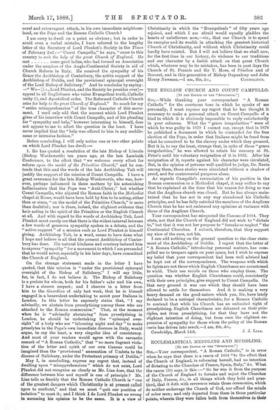THE ENGLISH CHURCH AND COUNT CAMPELLO.
[To THR EDITOR OF THE " SPECTATOR:1
Sri:Li—While thanking your correspondent "A Roman Catholic" for the courteous tone in which he speaks of me personally, I must express my regret that he has thought it necessary to make a personal attack on Count Campello of a kind to which it is obviously impossible to reply satisfactorily in your columns. What the "grave irregularities" were of which be was guilty in 1879 I cannot say, except that in 1876 he published a document in which he contended for the free election of the Pope, in order that Italians might be freed from what he conceived to be the slavery under which they groaned. But it is, to say the least, strange that, in spite of these "grave irregularities," he was allowed to retain his canonry at St. Peter's until his voluntary resignation of it in 1882. After his resignation of it, reports against his character were circulated, Bat, in the opinion of persons well qualified to judge, Dr. Nevin among them, those stories were circulated without a shadow of proof, and for controversial purposes alone.
As regards Campello's renunciation of his position in the Roman communion in a Methodist chapel, it may suffice to say that he explained at the time that his reason for doing so was that the Anglican church was closed. But he has always main- tained that he has not in any way abandoned his Catholic principles, and he has fully satisfied the members of the Anglican Church that he has not embraced any opinions at variance with those of the Anglican Church.
Your correspondent has misquoted the Canons of 1604. They state, not that the Church of England did not wish to "dictate to," but that it was not her purpose to "forsake or neglect" the Continental Churches. I submit, therefore, that they support my view of the case, not his.
I can add nothing on the general question to the clear state- ment of the Archbishop of Dublin. I regret that the letter of "A Roman Catholic," introducing personal matters, has com- pelled me to trespass again on your space, but I wish to express my belief that your correspondent had been well advised had he kept out of the correspondence. The weapons with which he fights are not those which English Churchmen are accustomed to wield. Their use recoils on those who employ them. The question was whether English Churchmen could, consistently with their own principles, give support to Count Campello. On that very ground it was one which they should have been allowed to settle for themselves. And it is making a very
heavy demand on the good-nature which you, Sir, have lately declared to be a national characteristic, for a Roman Catholic to contend that while his Church has an unlimited right of proselytising, English Churchmen are debarred on their prin- ciples, not from proselytising, for that they have not the slightest intention of doing, but from even the slightest ex- pression of sympathy for those whom the policy of the Roman curia has driven into revolt.—I am, Sir, drc., Cambridge, March 14th. J. J. Lies.


































 Previous page
Previous page